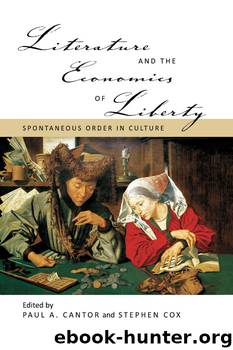Literature and the Economics of Liberty by Paul A. Cantor & Stephen Cox

Author:Paul A. Cantor & Stephen Cox [Cantor, Paul A.]
Language: eng
Format: epub
Publisher: Ludwig von Mises Institute
1 Myra thinks that Oswald is the enemy, and she is right.
2 Myra thinks that Oswald is the enemy, and she is wrong.
2 Myra thinks that she herself is the enemy, and she is right.
2 Myra thinks that she herself is the enemy, and she is wrong.
Cather confided in a private letter what she chose not to confide in her book: in her opinion, Oswald is the enemy. But she also indicated that she thought “most people” would not agree with her.82 She had not shaped the economy of the text so as to eliminate the risk of diverging choices. Quite the contrary: she had shaped it so as to emphasize that risk, omitting any authorial moralizing that might possibly reduce it.
So the novel is about the problem of choice, and it is a problem of choice. It was therefore criticized, wrongly but understandably, for being “[a]ll bones and no flesh.... Significant things are left out, and the reader is left not only unsatisfied, but also puzzled.”83 Some of Cather's most sympathetic and perceptive readers have been baffled by the novel or have tried to explain it in terms that are not its own. Woodress suggests that it provides a “comment on the destructive power of money”: “Myra is wrecked by greed” because she threw away her inheritance and then regretted it.84 But is money in itself to blame? Myra confesses that she is “greedy” for it, but she is greedy for other things, too. She especially wants an admiring “circle” of her “own kind.”85 She wants “community,” in the trendy phrase; and whatever she wants, she wants intensely. It is her intensity—by turns charming, repulsive, pathetic—that makes one pause before either condemning or acquitting her. And Cather won't provide the verdict herself.
She made generous allowance for the problems implicit in My Mortal Enemy. She said that although “[i]n form she thought the book faulty enough... one had to choose the thing most desired and try for it at the cost of everything else.”86 She knew that even in the economy of stories, you cannot have everything you want. Like Myra Henshawe, you have to choose what you most desire. What Cather chose, what she thought was valuable enough to buy at the price of “everything else,” was a brilliantly pure focus on the risks of choice and valuation. And that is what she got.
Download
This site does not store any files on its server. We only index and link to content provided by other sites. Please contact the content providers to delete copyright contents if any and email us, we'll remove relevant links or contents immediately.
Cecilia; Or, Memoirs of an Heiress — Volume 1 by Fanny Burney(32548)
Cecilia; Or, Memoirs of an Heiress — Volume 2 by Fanny Burney(31947)
Cecilia; Or, Memoirs of an Heiress — Volume 3 by Fanny Burney(31932)
The Great Music City by Andrea Baker(31917)
We're Going to Need More Wine by Gabrielle Union(19034)
All the Missing Girls by Megan Miranda(15958)
Pimp by Iceberg Slim(14488)
Bombshells: Glamour Girls of a Lifetime by Sullivan Steve(14057)
For the Love of Europe by Rick Steves(13914)
Norse Mythology by Gaiman Neil(13349)
Talking to Strangers by Malcolm Gladwell(13349)
Fifty Shades Freed by E L James(13233)
Mindhunter: Inside the FBI's Elite Serial Crime Unit by John E. Douglas & Mark Olshaker(9324)
Crazy Rich Asians by Kevin Kwan(9279)
The Lost Art of Listening by Michael P. Nichols(7494)
Enlightenment Now: The Case for Reason, Science, Humanism, and Progress by Steven Pinker(7306)
The Four Agreements by Don Miguel Ruiz(6745)
Bad Blood by John Carreyrou(6611)
Weapons of Math Destruction by Cathy O'Neil(6265)
